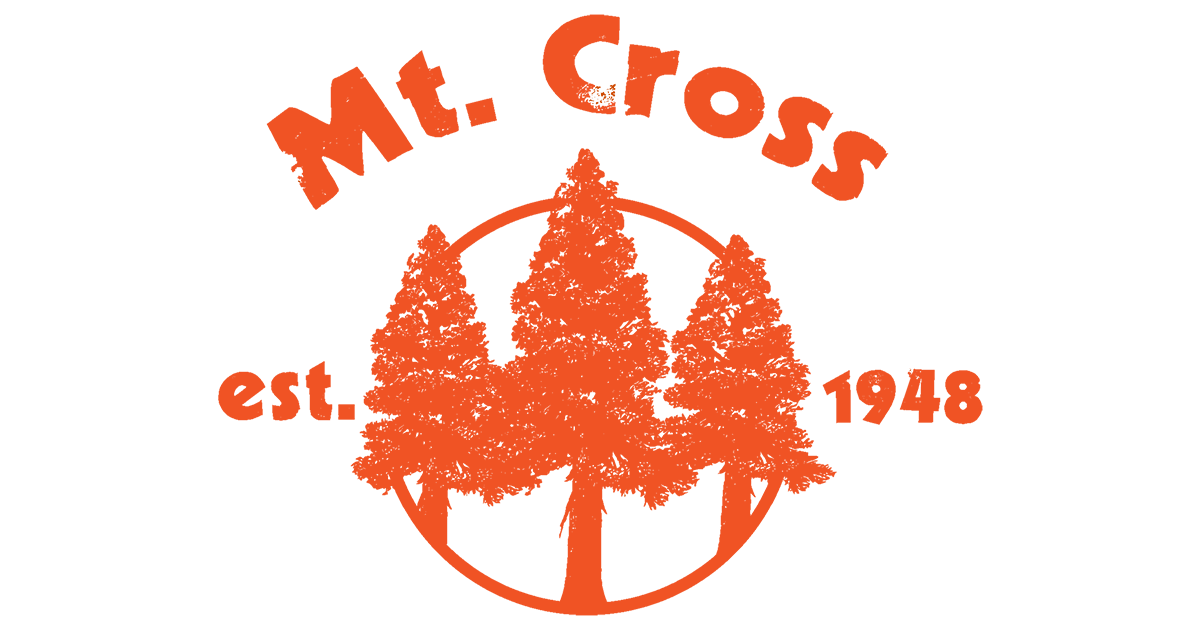Part Two of the Creation Series: Pastor Cristina Beauchemin invites us to trust God, care for creation, and live faithfully within God’s design — embracing our role as stewards of the earth and participants in God’s unfolding work of love.
SCRIPTURE READINGS
Our first reading this morning is from the thirty-ninth chapter of Job. God spoke to Job, saying, Do you know when the mountain’s goats give birth? Do you observe the calving of the deer? Can you number the months that they fulfill? And do you know the time when they give birth, when they crouch to give birth to their offspring and are delivered of their young? Their young ones become strong. They grow up in the open. They go forth and do not return to them. Who has let the wild donkeys go free? Who has loosed the bonds of these swift donkeys to which I have given the steep for its home, the salt land for its dwelling place? It scorns the tumult of the city. It does not hear the shouts of the driver. It ranges the mountains as its pasture, and it searches after every green thing. Is it by your wisdom that the hawk soars and spreads its wings toward the south? Is it at your command that the eagle mounts up and makes its nest high? It lives on the rock and makes its home in the fastness of the rocky crag.
Our second reading is from Psalm 104. You cause the grass to grow for the cattle and plants for people to cultivate, to bring forth food from the earth, wine to gladden the human heart, and oil and bread to strengthen the human heart. The trees of the field are watered abundantly in them, the birds build their nests. The stork has its home in the fir trees. The high mountains are for the wild goats. The rocks are a refuge for the coneys. You have made the moon to mark the seasons. The sun knows it’s time for setting. You make darkness and it’s night when all the animals of the forest come creeping out. People go out to their work and to their labor until the evening.
Today’s good news reading is the Gospel from Luke chapter 12. Jesus said to his disciples, therefore I tell you, do not worry about your life, what you will eat, or about your body, what you will wear, for life is more than food and the body more than clothing. Consider the. Havens, they neither sow nor reap. They have neither storehouse nor barn, and yet God feeds them. Of how much more value are you than the birds? And which of you by worrying can add a single hour to your span of life. If then you are not able to do a small a thing as that, why do you worry about the rest? Consider the lilies, how they grow. They neither toil nor spin, yet I tell you, even Solomon in all his glory was not clothed like one of these. But if God so clothes the grass of the field which is alive today and tomorrow is thrown into the oven, how much more will He clothe you, you of little faith. And do not keep seeking what you are to eat and what you are to drink and do not keep worrying. For it is the nations of the world that seek all these things, and your father knows that you need them. Instead, seek God’s kingdom, and these things will be given to you as well.
SERMON
I felt like I really should be singing a different song today, um. As I was reading through the text and thinking about this, and although it’s not up there, you do see this beautiful picture on your front and. I’m like, you know, this whole series of sermons, but today’s especially is born to be wild, and then it makes you wanna sing, doesn’t it? Like, does, does it not make you wanna start singing born to be wild.
Uh, OK, so I felt like that was like our theme. Like we gotta get, we gotta get busy and get wild and get crazy, but then what are we getting wild and crazy about as the more important part of this? If we’re born to be wild, then what is that wildness and sometimes in the midst of that wildness, what are some of the areas maybe we need to tame a little bit?
I was reading through and it turns out fauna, the word fauna, is an ancient Roman goddess. Anybody know that? I didn’t know that. Um, she is the goddess of fruitfulness, forests, and animals. She’s identified as having gifts of prophecy. And she was the wife, sister, and or daughter of the Roman nature godhaus, and in, in the Greek counterpart to the Romans, the Greek one would be Pan. Has anybody heard of Pan? Yeah, OK, so this is a little bit about her. Her prophetic voice gave power and distinction to the animal kingdom, which I find fascinating because this was a time during the Roman era that they’re they’re also experiencing and looking at these animals and what does it mean? They really, they realized that these animals were neither stupid and they were not just meant to be conquered and subdued. But in fact, they are creatures that are meant to be understood, they’re meant to be respected. And they’re meant to be learned from.
Last week when we were listening, maybe you were paying attention, maybe not, it’s OK, but we were reading through Job and I one of the, one of the lines that I always love is about the leaping leviathan. Anybody anybody remember hearing that the leaping leviathan in the bay waters, which obviously today we would probably refer to a leaping leviathan as a what? And oh well in Scotland, but we do have leaping leviathans definitely in Scotland, but a leaping leviathan would probably be a whale, right? splashing about and having a good time when I, uh, had an opportunity to go to the beach and spend some time, um, down in Southern California, we had the opportunity to watch and witness a seal who was just so excited apparently we had a, a school of fish going going by. And it was leaping out of the water, swimming underneath, coming back up, flippers flapping everywhere. I was entranced for probably 30 minutes because that’s how long it was feeding for, and I just stared at it and lo and behold, who comes leaping in two dolphins. And I’m like, oh, I’ll never leave the beach. This is the best day ever.
And what do we see when we see all these things with this opportunity to look at the animals, to engage with the wilderness and the wildness, that moment of being freed to do what is needed. And then as I’m thinking about this and we’re reading through Job and if you were paying attention, 30 beautiful verses of which God names 7 different animals in those 30 verses that we were listening to 30 different verses, and I love this idea that in the midst of Job questioning God, God turns it over, flips the table, turns it back, and just starts questioning Job. Like Job, where were you when these things happened? Where were you when all these things were going on? Job, how is it that you think you have all these answers and yet you have none.
And so these questioning animal roles and this opportunity of reading through all this, it’s that beauty of wisdom, the beauty of wisdom and the way that she stays her course throughout these understanding stories of who we are in the midst of creation. And it reminds me always when I read Job. That God is so far from our own human comprehension. God is so far from our own human comprehension. And also We’re humans and so centrally focused upon ourselves that we forget that God is in every detail, that God is in every detail and is equally concerned about the animals, flowers, the trees, the waters. And us, but equally so, equally so God isn’t just thinking only about human beings and our needs, but God is thinking about the needs of all aspects of creation and the understanding how important that creation is to sustain us.
We can’t let all of those things go because it’s the importance of that, the way all things work in our ecosystem that actually make it so that we can live in harmony here in this planet. And I don’t know if you guys know this or not, but we can’t live on any other planets. Does any did anybody know that? There are no other planets that can sustain us, no other planets that can sustain us, not one that we’re aware of. I don’t know about further out into a multitude of universes, but there’s no other place that can sustain human life but this planet. So. I think this planet becomes pretty important to us, yes. I think that if the only place we can actually be sustained is here we might wanna look at what here is and figure out what it means to be sustained in this this one spot this very big and very vast spot.
Last week as we were going through this, uh, oceans and we were talking about that, I don’t know if you remember that there is over 2 million life forms, over 2 million life forms in the waters we’ve discovered a little over 200,000 of them. But, but they know there’s more than 2 million. I don’t know. I didn’t look up the stats for on the actual Earth land creatures. I, I should have, but we also know there are millions of those as well that we just continue to find and learn and. And take take into consideration our ecosystem works together. None of it is OK separately, right? H2O is no good if you just have H. It’s no great. It’s not good if you just only have 10. You need two O’s in order for us to be breathing like all these things come together in a way that creates harmony for all living creatures. Note I said all living creatures, plants grow because of what? What’s the scientific word for how plants grow? Photosynthesis. So what does that mean? If that’s the thing, what, what is the thing they need? They need sunlight, they need water, they need. Oxygen, right? They need all of those things in order to grow.
Let me ask you a question, what do humans need to grow? We need oxygen to grow. What else do we need? Love, we, we do that is. Where was We need sunlight, right? What, what comes from sunlight? What’s the vitamin we get from sunlight? Vitamin D. How important is vitamin D to sustaining your bones? It’s, it’s very, very important. And other aspects. Actually, it’s also very important for mental stability. If you didn’t realize that your mind works, uh, D works with your mind, helps reduce, um, depression. So, taking your vitamin D is very important. It helps with bone strength. And that comes really the best way to get vitamin D. They always tell you, go outside, take your shirt off, you know, wear short sleeves, put some shorts on or something, go sit outside for 15 minutes. So, We’re not the only, we’re, we’re not the only ones who need the same things. We’re all fighting for the same thing. So what do animals need? They need to be able to eat, right? And so things all have to exist in this one ecosystem. The importance of our ecosystem is so intricate. Can you imagine if you were in charge of figuring out how to create our ecosystem? How many of you here could create an ecosystem to live it? I couldn’t even keep alive. You couldn’t even keep the ants alive in your ant farm. Uh, uh, Rosie, that was, that was brilliant, um.
Yeah, uh, if you’ve ever tried to raise a little, I mean, I was, I was the child who came back to my house with every, every kind of bug known to mankind. If I could find a bug, I brought it home. And then I put it in a box and I would go and try and figure out what it ate and I would susta try and sustain these bugs from grasshoppers, worms, caterpillar. I just would collect everything and bring it all home, um, and then of course. 9 times out of 10, I probably killed it or my mother forced me to go let it free so it wouldn’t die, whatever little creatures I was saving up in my, in my boxes in my room. Because I don’t know, and especially not at 7, I didn’t know how to sustain these little creatures’ lives. I don’t understand how in the ecosystem what they needed truly in order to be sustained. I thought I could just go and pick a leaf and put it in there and be like they will live forever and spray some water in once in a while and be like, I will grow these bugs for the rest of my life.
We don’t actually know what it all it takes. We do know how it works together. I think we’ve scientifically speaking, we have learned that. But we don’t, we don’t, we couldn’t we can’t we can’t remake it like we’ve we’ve thought about it. I mean people are like, well if we could just make another we could implant it to like Mars and then we could all go live in this other place and that’s not really, it’s not really how it works is this place. And you look around you, and you look outside and you begin to wander past the mountains and then down to the beaches or up into the mountains, this place is the place that’s been created for us. This place has been set forth for us to be able to live.
But there’s a problem. Sometimes we don’t really appreciate this place, right? And sometimes it takes a little something extra in order for us to be reminded of the importance of the place of which we have been entrusted to. And I think the animals are what the Bible really is pointing to today in our scriptures, if you were paying attention, is that constantly the idea was that the animals seem to get it right. The animals are doing the thing they need to do, and they’re not taking advantage of those things. And then animals are trusting, and I think this is a big one. Animals are trusting in the creation that they live in. The animals are trusting in the creation that they that they live in. I don’t know how much I trust in the creation any longer that we live in because we keep ruining it, so it’s a little bit different, but they trust in the creation.
And so when Jesus is working with the people, Jesus is looking at them and it’s like, OK. I see you’re stressing out about this, and I see you stressing out about that, and I see you stressing out over here and I see you stressing over there. Anybody relate to that? No, nobody relates to that silly, right? Jesus watches as our faith becomes less because our stress level goes up. Right? Our stress level goes up and our faith goes down because generally what’s happening is we’re relying upon everything we think we know. And we start to try and put all the things we think we know into practice like, well I know all these things and so these are the things that are going to make this happen, but how often do we stop and allow our faith and let God sort of be the catalyst to what is going to happen? How many people know what is it that’s saying, um, let go and let God, right? Isn’t that that’s a saying, isn’t it? Let go and let God. How many people have ever had to do that? Has anyone ever had to do that before? I got just a few of you. OK, there’s a handful of us. I’ll put my hand up twice, just, you know, probably abused that, taken that privilege.
How many of you found in the midst of doing that, taking that moment, not making it be all about you and allowing God to sort of become the catalyst in your moment, how many people found that things started working a little bit easier? Little bit, right? They over there they’re like, maybe. How many people found that as long as you stayed in charge, it was gonna be the best thing it could ever be. Me, come to me. I’m great. I’ll take control. There are times of which. In this, in this world. We have to let things go. Right, there are times in this world we have to let things go. And there are times in this world where you need to pick things up. And it gets complicated and it gets hard. And I think when we want to look at the big picture of what it is and how it is. We gotta know what we think is important.
So I read this quote, and I really, really liked this quote. Because I think sometimes we forget about what really is the things to pick up, because sometimes we just thought it was the dirty underwear, but I think there’s other things we have to pick up. And so I read this quote and I’m gonna read it to you. All creatures are equally important in God’s sight. We are asked not to worry or strive for food and drink, but to instead strive for the reign of God. A community that is characterized by the reign of God. sees these things as the priority. Justice. Equality Peace And love Just catch that justice, equality, peace, and love. They will also ensure the equitable sharing of life’s essentials, easing worry and anxiety about food, drink, or clothing. Food, drink, or clothing. I feel like I wanna get a shirt and I just wanna wear that around everywhere I go.
What could be more important than understanding the reign of God as a community characterized that’s doing justice, justice work, understanding what equality is looking and creating peace in all existence and loving others and when I say loving others maybe it’s just loving other because we just understood that it’s not just about humans but it’s about all aspects of the creation. So whether it’s you’re loving oceans or the animals in the oceans or you’re loving the earth and you’re trying to find more ways of being that that that encompassing of everything, how do we do that? I have friends that are vegans because for them that is one of the ways that they encompass caring and nurturing for the world is not falling into the trap. Of having to uh live off of protein, meats that are somehow or another also changing and polluting the world. It’s not just about not eating it because it’s an animal, but it’s about what happens when we create farms around the animal population and what it does to our environment. We know, we know that it is it’s toxic. And so understanding these aspects of how we go through this.
So as we are thinking about this as a community, how do we think about this as a community? If this is about the reign of God being characterized here in justice, equality, peace, and love, how do we do this? What do we do as community? So if we’re talking about animals, so I’m gonna give you a couple of really good instructions just they’re gonna be easy because I don’t like to do anything really hard. I want you to do some research on your Google phone app because everybody has or asked Siri. Cause she, she loves to tell you stuff or ask Alexa, she’ll tell you stuff too, we have so much information from AI now. Ask what is the greatest contributor to pollution these days. Find out, you know, what are, what are our animals, how much pollution are animals creating? And then think about what are some of the ways you can help counteract that? Just think about some ways you can counteract that. Think about how we’re polluting the oceans and we might be killing off. The fish, which by the way we eat, so we need the fish, but also we need not to eat all the fish, it’s complicated.
Take 10 minutes each day this week, just take 10 minutes each day and research a little bit about how we can change the way we see the animals in our world. And how we can sustain and change the way we’re doing things. I’m asking 10 minutes, who cannot, who, who sits on their phone every day for 1 hour playing games? OK, I, I didn’t need, I, I did, but I didn’t really. I want you to just take 10 minutes out of your game plan to do a little research. That’s all I want. I don’t, I’m not asking for a lot. I want you to take 10 minutes to do a little bit of research to to realize some of the different ways that we could be more environmentally, uh, sharing in justice, equality, peace and love with the animals. And how when we do that? Does it do it to each other as human beings? How is it that when we act that way to animals, does that then relate back to us as humans? That that’s your 10 minutes every day, 10 minutes. If you can’t do 10, try 5. If you can’t do it every day, do it once, OK, do it once, and then report back next week because I wanna find out what you guys are learning. I want to find out how we become this reign of God in a world that really needs us to be here, caring and not abusing, right? Caring and not abusing. So I’ve given you your homework. I didn’t look up a poem this week, so I just have to end it with the idea of what we have looking to be looking forward to.
We are, we are the sustainers. We have opposable thumbs, which means that we’re just a little bit of a step up from some of the other creatures in the world, uh, in this world, our world. Which means that we also are the ones that need to be making logical good decisions, right? We have to be the ones who do that. And so if we’re not the ones I don’t know who is. So as you go thinking about. Your faith And how it’s, it’s not, it’s not about all of these difficult things to be faithful. I want you to be faithful this week to the animals and to each other, and I want you to come back and let me know what you’ve learned, all of us, what you’ve learned and what we can do to make this place a better place. Amen. Amen.
SCRIPTURE REFERENCES
- Job 39
- Psalm 104
- Luke 12:22–31

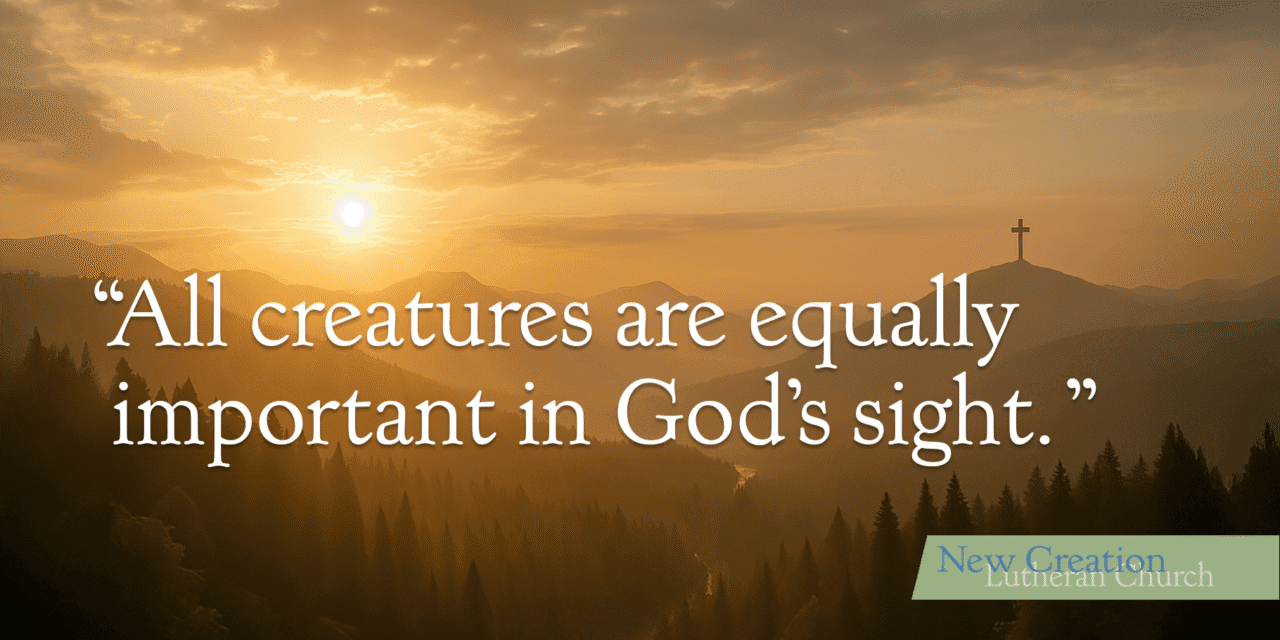
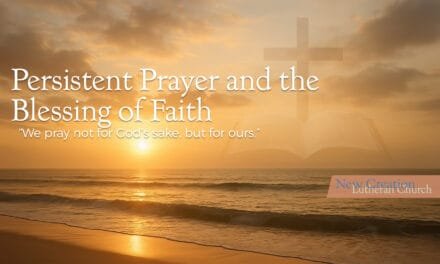
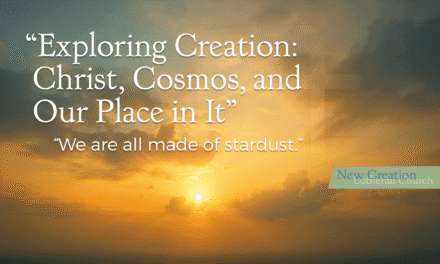
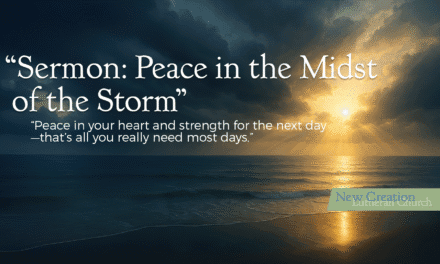
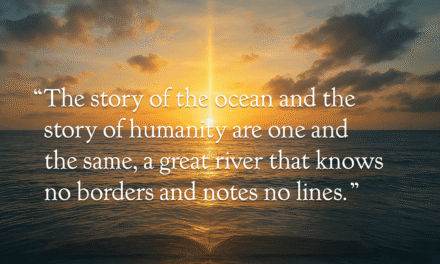
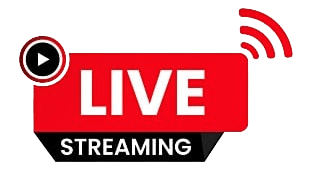

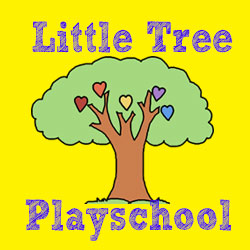
 Our Latest Updates on
Our Latest Updates on
